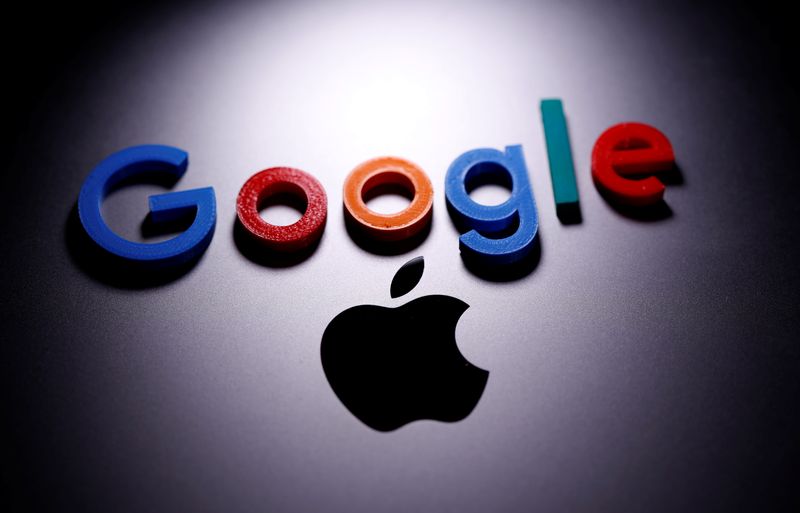
©Reuters. A 3D printed Google logo is placed on the Apple Macbook in this illustration taken April 12, 2020. REUTERS/Dado Ruvic/Illustration
By Foo Yun Chee and Supantha Mukherjee
BRUSSELS/STOCKHOLM (Reuters) – Big Tech faces its biggest challenge in decades as antitrust regulators on both sides of the Atlantic crack down on alleged anticompetitive practices that could lead to breakup orders at Apple (NASDAQ: ) and Alphabet (Google of the NASDAQ:), an absolute first in the sector.
This in turn could inspire regulators around the world to step up their efforts, as evidenced by the growing number of antitrust investigations in various countries following the opening of EU and US cases. Since AT&T (NYSE:) was split off exactly 40 years ago, no company has faced the possibility of a regulator-led breakup in the United States until now.
Google said it disagreed with the EU’s allegations, while Apple said the US lawsuit was wrong in fact and law.
In 1984, AT&T, also known as Ma Bell, was split into seven independent companies called the “Baby Bells” to open one of the most powerful monopolies of the 20th century. AT&T, Verizon (NYSE:) and Lumen are currently the only surviving entities.
Regulators now argue that companies like Apple and Google have built impenetrable ecosystems around their products, making it difficult for customers to switch to rival services, leading to the coining of the term walled gardens.
The US Department of Justice on Wednesday warned Apple, a $2.7 trillion company, that a break-up order is not out of the question as a remedy to restore competition after it teamed up with 15 states to sue the iPhone maker for monopolizing the smartphone market, hindering rivals and inflating prices.
Even so, it will likely take years to decide the case, which Apple has vowed to fight.
US stocks follow on the heels of other growing threats across Europe this week.
Big Tech will soon face increased scrutiny with Apple, Meta Platforms (NASDAQ:) and Alphabet likely to be investigated for potential violations of the Digital Markets Act (DMA) that could lead to large fines and even disbandment orders for repeat violations , people with direct access The news was reported to Reuters on Thursday on condition of anonymity.
EU antitrust chief Margrethe Vestager helped pave the way for drastic measures last year when she accused Google of anticompetitive practices in its adtech business and that it may have to divest its sales tools.
It said requiring Google to sell some of its assets appears to be the only way to avoid conflicts of interest as it would prevent Google from allegedly favoring its own online digital advertising technology services over online advertisers and publishers.
Vestager is expected to issue a final decision later this year.
European Parliament member Andreas Schwab, who was heavily involved in drafting the EU’s landmark DMA technology rules that came into force this month, said lawmakers want bold action against Big Techs that flout the rules.
“If they don’t respect the DMA, you can imagine what Parliament will ask for. Separations. The ultimate goal is to make markets open, fair and allow for more innovation,” he said on Friday.
LEAVING ONESELF IS DIFFICULT
It is uncertain whether regulators will issue a dissolution order as they weigh options, and any action could only result in a fine. Legal experts have also suggested that the case against Apple, inspired by the 1998 case against Microsoft (NASDAQ:), could be more difficult this time.
“There is less of a tradition in the European Union, where splitting a company is seen as a last resort. This has never happened before,” said a Commission official, speaking on condition of anonymity.
Apple’s highly integrated system would also make a breakup from Google difficult, said attorney Damien Geradin of Geradin Partners, who is assisting several app developers in other cases against Apple.
“It seems much more complicated to me. We’re talking about something integrated, for example you can’t force Apple to give up its App Store. This doesn’t make sense,” he said.
In his opinion, it would be better to impose behavioral remedies on Apple that force it to do certain things, while in the case of Google a break-up order could simply target acquisitions made to strengthen its key services.
“What is more likely is that (the DOJ) will opt for remedies such as opening up hardware capabilities or ensuring that developers are not discriminated against in terms of pricing,” said Max von Thun, director of the advocacy group Open Markets .
“I think they want to say that everything is on the table, but that doesn’t necessarily mean they’re going to choose that path,” he said.
Apple gets most of its revenue of nearly $400 billion a year from selling hardware — iPhones, Macs, iPads and watches — followed by its services business, which will bring in about $100 billion a year.
Structural remedies such as breakups will eventually be tested in the courts, said Assimakis Komninos, partner at law firm White & Case.
“I would say that the experiences of imposed structural measures, such as separations, are not many, but the little past experience shows that this is very complicated, apart from the formidable legal challenges,” he said.